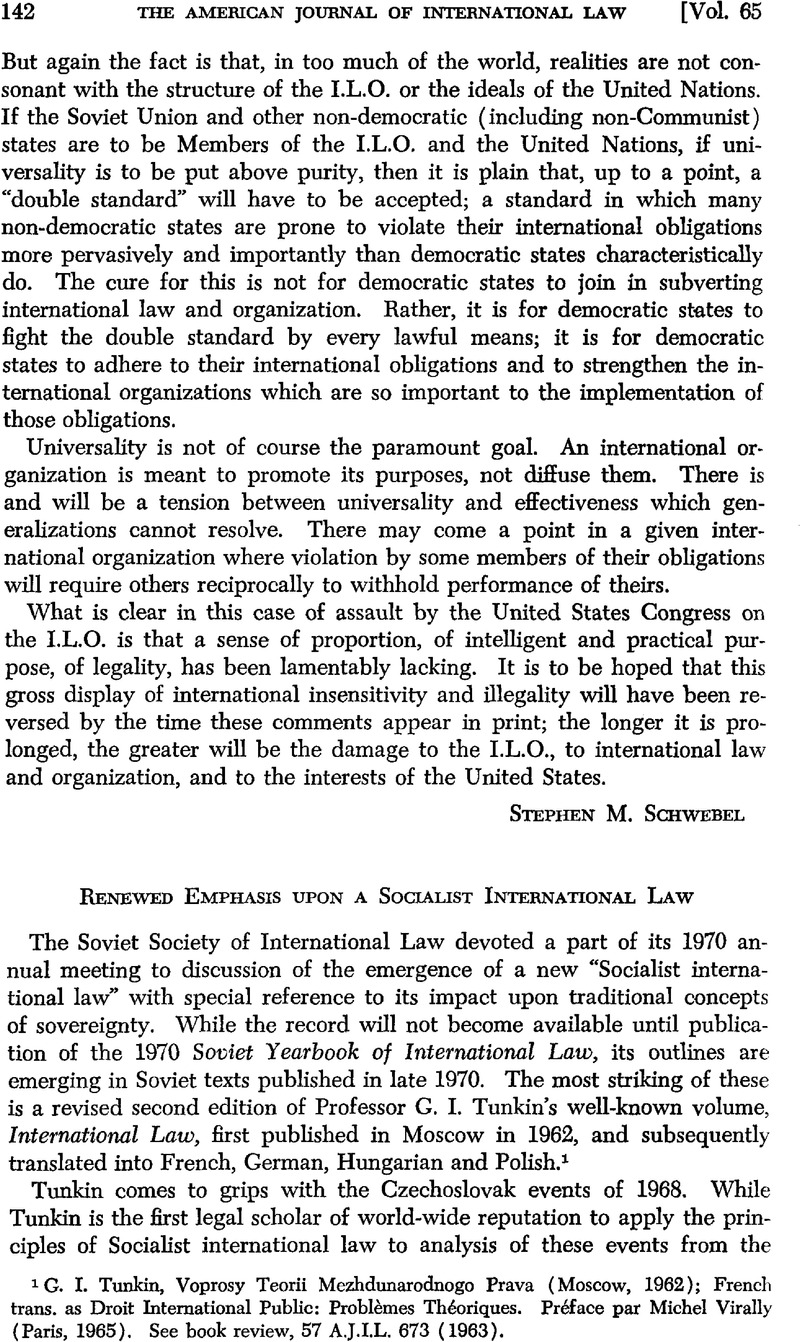Article contents
Renewed Emphasis upon a Socialist International Law
Published online by Cambridge University Press: 28 March 2017
Abstract

- Type
- Editorial Comment
- Information
- Copyright
- Copyright © American Society of International Law 1971
References
1 Tunkin, G. I., Voprosy Teorii Mezhdunarodnogo Prava (Moscow, 1962)Google Scholar; French trans, as Droit International Public: Problemes Théoriques. Préface par Michel Virally (Paris, 1965). See book review, 57 A.J.I.L. 673 (1963).
2 Tunkin, G. I. (ed.), Contemporary International Law (Moscow, 1969)Google Scholar.
8 Ibid, at 70.
4 A summary of the literature on the subject was published in this Journal as Hazard, , “Cleansing Soviet International Law of Anti–Marxist Theories,” 32 A.J.I.L. 244 (1938)Google Scholar.
5 The issue of “new law” was avoided in the 3–volume treatise by V. N. Durdenevskii and S. B. Krylov, published as the World War was finishing. See book review, 41 A.J.I.L. 481 (1947). The next study, written by F. I. Kozhevnikov, later to become a Judge of the International Court of Justice, also took no position on the subject. His colleague, Professor E. A. Korovin, took him to task for failing to take into consideration the new People’s Democracies. See Korovin, E. A., book review, 43 A.J.I.L. 387 (1949)Google Scholar. Kozhevnikov in a much rewritten second volume a year later concluded that Soviet relations with the People’s democracies were creating a new Socialist international law.
6 This theme pervaded Tunkin’s leading article in the first yearbook published by the Soviet Society of International Law as Soviet Yearbook of International Law, 1958 (Moscow, 1959).
7 Ibid, at 36.
8 Tunkin, Novy tip mezhdunarodnykh otnoshenii i mezhdunarodoe pravo [A New Type of International Law], [1959] Sovetskoe Gosudarstvo i Pravo, No. 1, at 81, 94. A Western scholar has interpreted Tunkin’s position of 1959 as a contradiction of the opinions expressed a few months earlier in his Hague lectures. See Grzybowski, K., Soviet Public International Law: Doctrines and Diplomatic Practice 18 (1970)Google Scholar.
9 Note 2 above, at 70.
10 Lisovskii, V. I., Mezhdunarodnoe Pravo [International Law] (Moscow, 1970)Google Scholar. For reviews of first and second editions, see 51 A.J.I.L. 135 (1957), and 57 ibid. 673 (1963).
11 Ibid, at 50.
12 Ibid, at 51.
13 Ibid, at 55.
14 Tunkin, G. I., Teoriia Mezhdunarodnogo Prava [The Theory of International Law] at 493 (2nd revised ed., Moscow, 1970)Google Scholar.
15 Ibid, at 495.
16 Ibid, at 498–499.
17 The Russian text appears in [1964] Sovetskoe Gosudarstvo i Pravo, No. 7, at 17. An English trans, of pertinent paragraphs is in Hazard, Shapiro and Maggs, The Soviet Legal System at 34 (2nd ed., Dobbs Ferry, N. Y., 1969).
18 Tunkin, G. I., Ideologicheskaia Bor’ba i Mezhdunarodnoe Pravo [The Ideological Struggle and International Law] (Moscow, 1967)Google Scholar. See book review in 62 A.J.I.L. 208 (1968).
- 1
- Cited by




